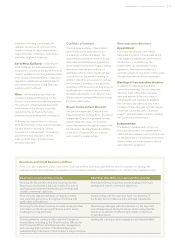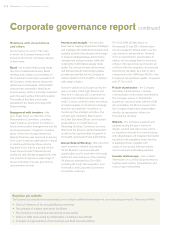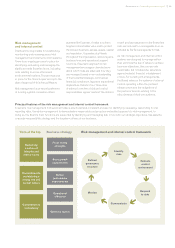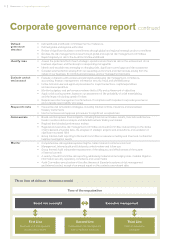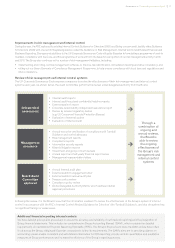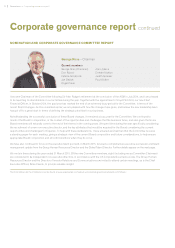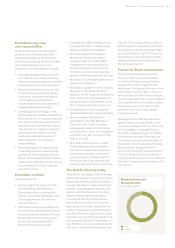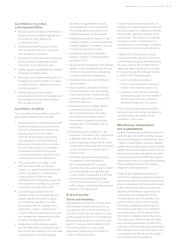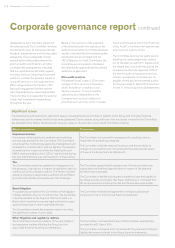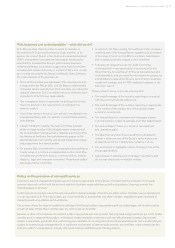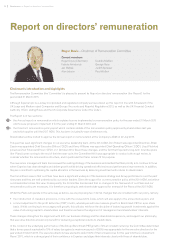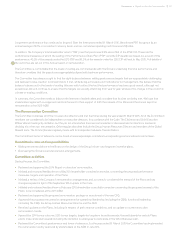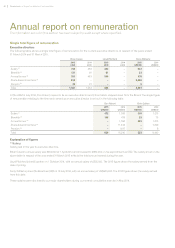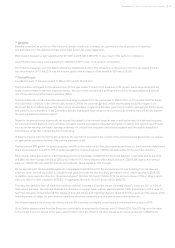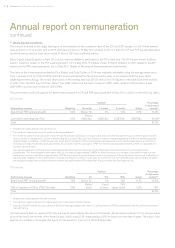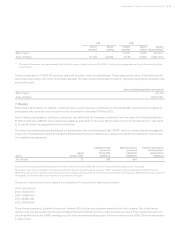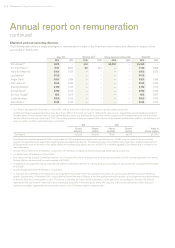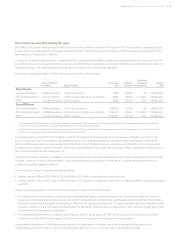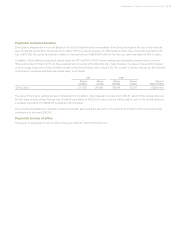Experian 2015 Annual Report Download - page 79
Download and view the complete annual report
Please find page 79 of the 2015 Experian annual report below. You can navigate through the pages in the report by either clicking on the pages listed below, or by using the keyword search tool below to find specific information within the annual report.
Policy on the provision of non-audit services
This policy has not changed during the year and remains appropriate for the Group. Provided that the provision of non-audit
services does not conflict with the external auditor’s statutory responsibilities and ethical guidance, they may provide the
following types of services:
Further assurance services: where the external auditor’s deep knowledge of the Group’s affairs means that they may be best placed
to carry out such work. This may include, but is not restricted to, shareholder and other circulars, regulatory reports and work in
connection with acquisitions and divestments.
Tax services: where the external auditor’s knowledge of the Group’s affairs may provide significant advantages, which other parties
would not have. Where this is not the case, the work is put out to tender.
General: in other circumstances, the external auditor may provide services provided that proposed assignments are put out to tender
and decisions to award work are taken on the basis of demonstrable competence and cost effectiveness. However, the external
auditor is specifically prohibited from performing work related to accounting records and financial statements that will ultimately be
subject to external audit; management of or significant involvement in internal audit services; any work that could compromise the
external auditor’s independence; and any other work that is prohibited by UK ethical guidance.
‘Fair, balanced and understandable’ – what did we do?
At its May meeting, the Committee is asked to consider, in
line with the UK Corporate Governance Code, whether, in its
opinion, the Annual Report is fair, balanced and understandable
(‘FBU’) and whether it provides the information necessary for
shareholders to assess the Group’s performance, business
model and strategy. A process to support the Audit Committee
in making this assessment was put in place in 2013, and we also
use a similar process for the Group’s half-yearly financial report.
The main elements of the process are:
• The Audit Committee was appraised of the new requirement,
introduced by the FRC in 2012, and the Board confirmed that
it required advice annually from the Committee on making the
required statement. The Committee’s terms of reference were
amended to reflect its new responsibility.
• The management team responsible for drafting the Annual
Report is briefed on the requirement, including by the
external auditor.
• A list of key ‘areas to focus on’ (see below) is circulated to the
management team, who are asked to consider these areas in
their drafting.
• Ahead of its March meeting, the Audit Committee receives:
drafts of a large number of the Strategic report components of
the Annual Report; draft governance material; a summary of the
key features of the Group financial statements; papers on the
appropriateness of accounting policies and impairment reviews;
and a paper from the external auditor.
• An internal FBU committee then considers the Annual Report.
A wide range of functions are represented on this committee,
including executives from finance, communications, investor
relations, legal and corporate secretariat. The external auditor
also supports the committee.
• In advance of its May meeting, the Audit Committee receives a
near-final draft of the Annual Report, together with a reminder
of the ‘areas to focus on’. The FBU committee’s observations
and conclusions are also relayed to the Committee.
• Following its review this year, the Audit Committee
concluded that it was appropriate to recommend to the
Board that the Annual Report 2015 was fair, balanced and
understandable, and provided the information necessary for
shareholders to assess the Group’s performance, business
model and strategy, and the FBU statement appears in the
Directors’ report.
The key areas to focus on include ensuring that:
• The overall message of the narrative reporting is consistent
with the primary financial statements.
• The overall message of the narrative reporting is appropriate,
in the context of the industry as a whole and the wider
economic environment.
• The Annual Report is consistent with messages already
communicated to investors, analysts and other stakeholders.
• The Annual Report ‘taken as a whole’ is fair, balanced
and understandable.
• The Chairman and Chief Executive Officer’s statements
include a balanced view of the Group’s performance and
prospects, and of the industry and market as a whole.
• Any summaries or highlights capture the big picture of the
Group appropriately.
• Case studies or examples are of strategic importance and
do not over-emphasise immaterial matters.
77
Governance •Corporate governance report


